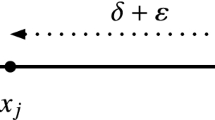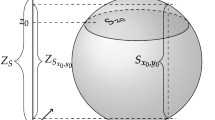Abstract
I investigate the role played by the combination of two invariance axioms for preferences in utility theory; namely, those of zero-independence and scale-independence, respectively. I provide a characterization of the preference relations on \({\mathbb{R}^{n}}\) that satisfy these two axioms as those which are either trivial, or what I call a two-serial total preorder on \({\mathbb{R}^{n}}\). This result is then applied in social choice theory to characterize those social welfare functions that satisfy IIA and PI. Other characterizations involving the usual Pareto concepts are also provided.
Similar content being viewed by others
References
Arrow KJ (1963) Social choice and individual values. 2. Wiley, New York
Bossert W, Weymark JA (2004) Utility in social choice. In: Barberà S, Hammond PJ, Seidl CH (eds) Handbook of utility theory, Vol 2. Kluwer Academic Publishers, Amsterdam, pp 1099–1177
Bridges DS, Mehta GB (1995) Representations of preference orderings. Springer, Berlin
Campbell DE, Kelly JS (2002) Impossibility theorems in the Arrovian framework. In: Arrow KJ, Sen A, Suzumura K (eds) Handbook of social choice welfare, vol 1. North-Holland, Amsterdam, pp 35–94
Candeal JC (2011) Subgroup independent conditions on preferences. Soc Choice Welf forthcoming. doi:10.1007/s00355-0110-0558-x
d’Aspremont C (1985) Axioms for social welfare orderings. In: Hurwicz L, Schmeidler D, Sonnenschein H (eds) Social goals and social organization. Essays in memory of Elisha Pazner. Cambridge University Press, Cambridge, pp 19–76
d’Aspremont C, Gevers L (1977) Equity and the informational basis of collective choice. Rev Econ Stud 44: 199–209
d’Aspremont C, Gevers L (2002) Social welfare functionals and interpersonal comparability. In: Arrow KJ, Sen A, Suzumura K (eds) Handbook of social choice welfare, vol 1. North-Holland, Amsterdam, pp 459–541
Fishburn PC (1974) Lexicographic orders, utilities and decision rules: a survey. Manage Sci 20: 1442–1471
Fleurbaey M, Hammond PJ (2004) Interpersonally comparable utility. In: Barberà S, Hammond PJ, Seidl Ch (eds) Handbook of utility theory, vol 2. Kluwer Academic Publishers, Amsterdam, pp 1179–1285
Gevers L (1979) On interpersonal comparability and social welfare orderings. Econometrica 47: 75–89
Hammond PJ (1979) Equity in two person situations: some consequences. Econometrica 47: 1127–1135
Hausner M, Wendell JG (1952) Ordered vector spaces. Proc Am Math Soc 3: 977–982
Hungerford TW (2003) Algebra. Graduate Texts in Mathematics, vol 73. 5. Springer, New York
Krause U (1995) Essentially lexicographic aggregation. Soc Choice Welf 12: 233–244
Mossel E, Tamuz O (2012) Complete characterization of functions satisfying the conditions of Arrow’s theorem. Soc Choice Welf 39: 127–140
Sen AK (1970) Collective choice and social welfare. Holden-Day, San Francisco
Sen AK (1974) Informational bases of alternative welfare approaches: aggregation and income distribution. J Public Econ 3: 387–403
Sen AK (1977) Individual preferences as the basis of social choice. In: Arrow KJ, Sen A, Suzumura K (eds) Social choice re-examined, vol I. Macmillan Press, London, pp 15–38
Wilson RB (1972) Social choice without the Pareto principle. J Econ Theory 5: 14–20
Author information
Authors and Affiliations
Corresponding author
Rights and permissions
About this article
Cite this article
Candeal, J.C. Invariance axioms for preferences: applications to social choice theory. Soc Choice Welf 41, 453–471 (2013). https://doi.org/10.1007/s00355-012-0692-0
Received:
Accepted:
Published:
Issue Date:
DOI: https://doi.org/10.1007/s00355-012-0692-0




